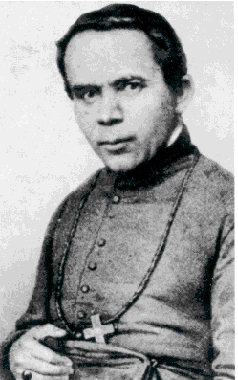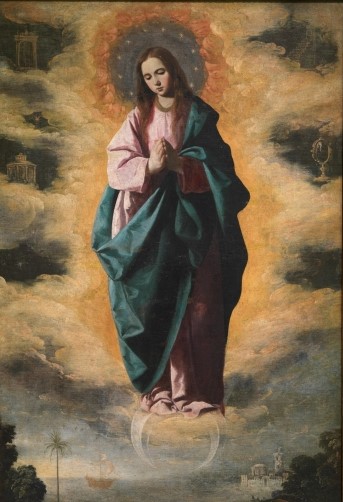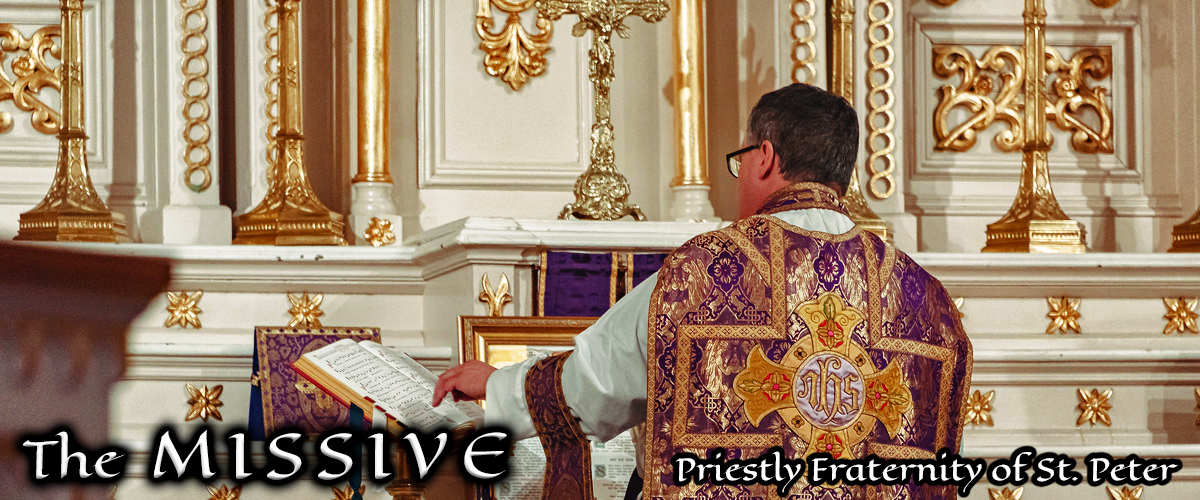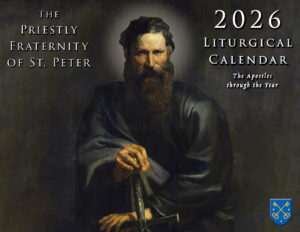St. John Neumann on the Immaculate Conception
In 1854, St. John Neumann, bishop of Philadelphia, was invited to Rome to attend the promulgation of the dogma of the Immaculate Conception. Before he set sail, he issued an edifying Pastoral letter to his flock where he touched on this privilege of Our Lady. In joyous celebration today of the patroness of the USA, we are pleased to print an excerpt of this letter below. –ed.
 “Although the Church has not yet declared the Immaculate Conception to be an article of faith, nevertheless it is evident she cherishes this most just and pious belief with a loving constancy second only to that infallible certainty with which she maintains the truth of all those doctrines the acceptance of which is necessary for salvation. With a zeal probably never surpassed in former ages, the subject has been investigated by many of the most gifted and holy men now living; and with such a munificent outlay of ancient and modern learning, of profound argument and soul-stirring eloquence have they treated it, as to leave not only the more devout clients of Mary, but every unbiassed mind convinced beyond the possibility of doubt, that if there be anything certainly true, next to the defined doctrines of faith, it is this apostolic and therefore ancient and beautiful belief.
“Although the Church has not yet declared the Immaculate Conception to be an article of faith, nevertheless it is evident she cherishes this most just and pious belief with a loving constancy second only to that infallible certainty with which she maintains the truth of all those doctrines the acceptance of which is necessary for salvation. With a zeal probably never surpassed in former ages, the subject has been investigated by many of the most gifted and holy men now living; and with such a munificent outlay of ancient and modern learning, of profound argument and soul-stirring eloquence have they treated it, as to leave not only the more devout clients of Mary, but every unbiassed mind convinced beyond the possibility of doubt, that if there be anything certainly true, next to the defined doctrines of faith, it is this apostolic and therefore ancient and beautiful belief.
Hence it is not surprising that, wherever enlightened piety exists, hardly a moment’s hesitation on this subject will be entertained. — Caro Jesu! Caro Mariæ ! –“The flesh of Jesus is the flesh of Mary!” they will at once exclaim with the great St. Augustine.
How can it be that the God of all purity, to whom even the least shadow of sin is an object of eternal abhorrence, should have suffered His Virgin Mother to be, even for an instant, such an object in His sight? From her He received that flesh and blood-that human nature in which, made one with the Divinity, He redeemed the world: and can we believe that the same in Mary’s person, in any possible degree, was ever sullied by the demon’s breath, dishonored by the taint of guilt? Or, again, with St. Cyril the pious Catholic will ask, “Who hath ever heard that an architect built a glorious dwelling for himself and at once gave it over to be possessed by his most cruel and hated enemy?’
If there were no other words of Holy Writ on this topic than these: “Mary, of whom was born Jesus, who is called Christ’ (St. Matt. i. 16.)—they would be amply sufficient. Behold the divine fact that overthrows every difficulty, the inspired oracle that sweeps away every objection!
Never, Christian brethren, never can we admit that she was for one moment the slave of the devil;—the Virgin who was destined to be the Mother of God, the Spouse of the Holy Spirit, the Ark of the New Covenant, the Mediatrix of Mankind, the Terror of the Powers of Darkness, the Queen of all the Heavenly Hosts.
 Purer than heaven’s purest angel, brighter than its brightest seraph, Mary, after her Creator, God, –who made and gave her all–is the most perfect of beings, the masterpiece of Infinite Wisdom, Almighty Power, and Eternal Love.
Purer than heaven’s purest angel, brighter than its brightest seraph, Mary, after her Creator, God, –who made and gave her all–is the most perfect of beings, the masterpiece of Infinite Wisdom, Almighty Power, and Eternal Love.
To such a being we cannot reasonably suppose that a perfection was denied which had been already gratuitously bestowed on inferior creatures–on the Angelic Spirits, for example, some of whom afterward fell away from God and are lost forever. And again, the first man and the first woman were created sinless–pure as the virgin world on which the Almighty had just looked down with infinite delight and declared it to be “valde bona!”-exceeding good!
How just and natural, therefore,–may we not add, how unavoidable?–is the conclusion that this sublime privilege was not withheld from Mary, set apart as she was from all eternity for an office and for honors in the kingdom of God, to which no other created being ever will or can be exalted! The more so since profound divines do not hesitate to assert that, rather than be without the grace conferred upon her in her Immaculate Conception, and thus, though only for an instant, an object of God’s displeasure, Mary would have preferred to forfeit forever the infinite dignity of being the Mother of Jesus Christ.
Gladly would we dwell more at length on the subject, but as you may yourselves observe the occasion does not allow it. The few thoughts we have uttered are but the echo of Christian antiquity, of the faith, the filial love, the confidence in Mary, when apostles and evangelists were still on earth and revered her name.
How profound should be our gratitude in being able to say, that name we also reverence, their confidence in Mary we cherish, their filial love we share, their faith is ours! Could the Martyrs and Virgins, the heroic confessors of the faith, the renowned Fathers and Doctors of the Church, “beloved of God and men, and whose memory is in benediction” (Eccles. xlv.)–could these arise and unite their voices to those of their successors now around the Chair of Peter, what would be their testimony?
They would point to their immortal writings, and in the language of St. Augustine, so worthy a representative of the genius, wisdom, and piety of the primitive Church, they would remind us that when they speak of the law by which all the children of Adam are born children of wrath, “they speak not of Mary,” with regard to whom, on account of the honor due to our Lord, when they discourse of sin they wish to raise no question whatsoever. (Lib. de nat, et grat.) Nay, with an Amen, loud as that which St. Jerome tells us rolled through the magnificent churches of Rome like the thunder of heaven, they would respond to the following declaration of the Council of Trent (Sess. V.): ‘This Holy Synod declares that it is not its intention to include in this decree, where original sin is spoken of, the Blessed and Immaculate Mother of God.’
May the day soon dawn upon the world–whether it be in our unhappy times or not–when with one mind and heart Christendom will acknowledge and proclaim this her most honorable privilege!”
December 8, 2021








